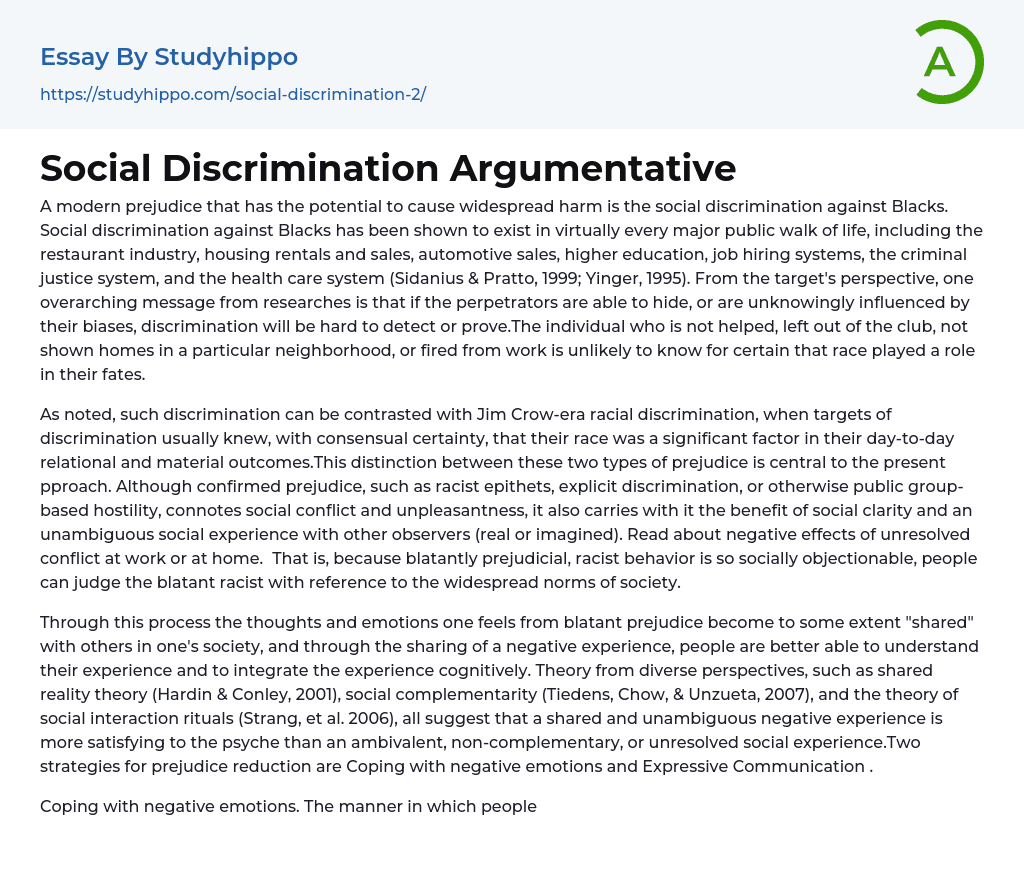A modern prejudice that has the potential to cause widespread harm is the social discrimination against Blacks. Social discrimination against Blacks has been shown to exist in virtually every major public walk of life, including the restaurant industry, housing rentals and sales, automotive sales, higher education, job hiring systems, the criminal justice system, and the health care system (Sidanius & Pratto, 1999; Yinger, 1995). From the target's perspective, one overarching message from researches is that if the perpetrators are able to hide, or are unknowingly influenced by their biases, discrimination will be hard to detect or prove.The individual who is not helped, left out of the club, not shown homes in a particular neighborhood, or fired from work is unlikely to know for certain that race played a role in their fates.
As noted, such discrimination can be contrasted with Jim Crow-era racial discrimination, when targets of discrimination usually knew, with consensual certainty, that their race was a significant factor in their day-to-day relational and material
...outcomes.This distinction between these two types of prejudice is central to the present pproach. Although confirmed prejudice, such as racist epithets, explicit discrimination, or otherwise public group-based hostility, connotes social conflict and unpleasantness, it also carries with it the benefit of social clarity and an unambiguous social experience with other observers (real or imagined). Read about negative effects of unresolved conflict at work or at home. That is, because blatantly prejudicial, racist behavior is so socially objectionable, people can judge the blatant racist with reference to the widespread norms of society.
Through this process the thoughts and
emotions one feels from blatant prejudice become to some extent "shared" with others in one's society, and through the sharing of a negative experience, people are better able to understand their experience and to integrate the experience cognitively. Theory from diverse perspectives, such as shared reality theory (Hardin & Conley, 2001), social complementarity (Tiedens, Chow, & Unzueta, 2007), and the theory of social interaction rituals (Strang, et al. 2006), all suggest that a shared and unambiguous negative experience is more satisfying to the psyche than an ambivalent, non-complementary, or unresolved social experience.Two strategies for prejudice reduction are Coping with negative emotions and Expressive Communication .
Coping with negative emotions. The manner in which people cope with negative social events, such as racial prejudice, can be usefully understood with the concept of a psychological immune system (Glibert, Pinel, Wilson, Blumberg, & Wheatley, 1998).This conception connotes the human ability to initiate behavioral, cognitive, and hysiological adaptations that protect and heal the psyche from external threats, much like the response of the actual immune system under threat from pathogens (Gilbert et al. , 1998; Gilbert, 2006).
These adaptations include the social strategies that people employ to help resolve negative life-events. For example, in the face of trauma from the death of a loved one or getting fired from work, a person might call a friend, write in a diary, and/or talk to a therapist, all of which have generally been found to reduce negative thoughts and feelings about traumatic events and speed recovery from the trauma.However, and critically for the present research, not all events evoke coping responses equally. Traumatic or clearly negative responses, such as blatant or confirmed prejudice,
are likely to engage the immune system more effectively than ambiguously negative events, such as denied prejudice (Gilbert, Lieberman, Morewedge, & Wilson, 2004). Expressive Communication as a Coping Mechanism.
To examine how individuals cope with social discrimination, a coping mechanism was studied that has been shown by previous research to be effective in helping people cope with negative life events (e. . , through reducing negative affect and improving general health).Researchers have been exploring the potential health benefits of translating negative experiences into words for over 25 years (Niederhoffer & Pennebaker, 2002), and numerous studies have now highlighted both the psychological and health benefits associated with expressive communication on traumatic life experiences (Lepore, Greenberg, Bruno, & Smyth, 2002). In general, this research has found similarly beneficial effects for expressively writing and talking about negative events (Niederhoffer & Pennebaker, 2002).The expressive communication research paradigm began with the finding that when college students expressed emotion while talking about traumatic past events, they displayed lower blood pressure, muscle tension, and skin conductance.
Other studies found that, compared with control subjects, subjects asked to disclose and interpret their most traumatic life experiences reported fewer subsequent doctor benefits and displayed improved physical immune system functioning (Niederhoffer & Pennebaker, 2002).
- Malcolm X essays
- Black Lives Matter essays
- Antisemitism essays
- Ku Klux Klan essays
- Miscegenation essays
- Racial Segregation essays
- I Have a Dream essays
- Martin Luther King essays
- Racial Inequality essays
- Black History Month essays
- Black People essays
- Ageism essays
- Cultural Diversity essays
- Discrimination essays
- Diversity essays
- Gender Discrimination essays
- Multiculturalism essays
- Oppression essays
- Peer Pressure essays
- Racial Profiling essays
- Sexism essays
- Physical therapy essays
- Psychological Trauma essays
- Abortion essays
- Abuse essays
- Animal Rights essays
- Animal Testing essays
- Assault essays
- Bullying essays
- Controversial Issue essays
- Crash essays
- Cyber Bullying essays
- Feminism essays
- Human Rights essays
- Immigration essays
- Inequality essays
- Poverty essays
- Prejudice essays
- Racism essays
- Torture essays
- Violence essays




